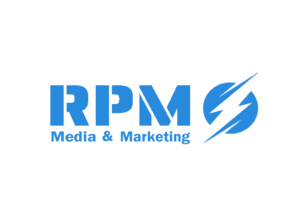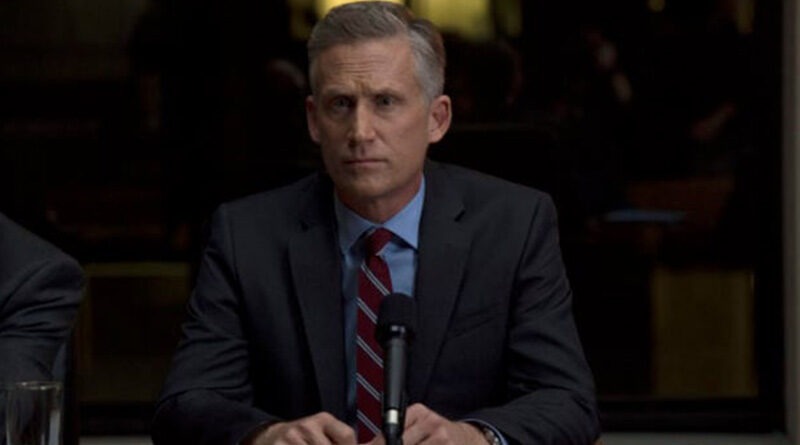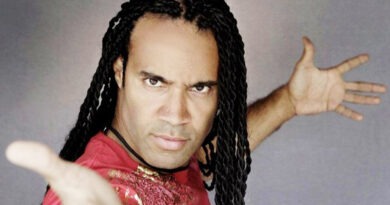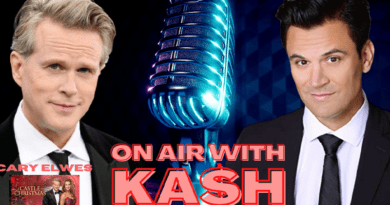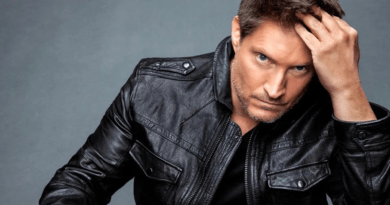Reed Diamond
An incredible career of films, television, theater and more, Reed Diamond has graced our screens for decades in compelling, interesting roles and he’s still going! He has been seen on shows such as WAYWARD PINES, BETTER CALL SAUL, BOSCH, 13 REASONS WHY, and DESIGNATED SURVIVOR amongst others. Some of his appearances on the silver screen include SPIDER MAN 2, the Oscar nominated picture MONEYBALL, and MEMPHIS BELLE. He starred as one of the leading roles in the cop drama HOMICIDE: LIFE ON THE STREET. Reed has over 100 credits and isn’t slowing down anytime soon.
ILLUMINATE: Hello, Reed. Thank you so much for joining me here for Illuminate Magazine.
DIAMOND: Thank you for having me. It’s an honor to be here.
ILLUMINATE: Oh, thank you. I’m so happy that you’re here. And now we can actually talk about the project that we worked on together, THE MOSQUITO COAST, which is an Apple TV+ Original starring Justin Theroux. We can’t really give much away about our characters but tell us a little bit about what you can say and your experience filming in Mexico.
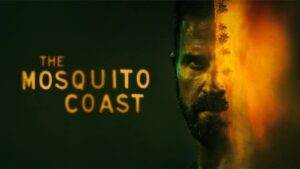
DIAMOND: We can’t say anything. We can’t give any plot lines away, but he’s within the pantheon of my horrible white men characters. Douchey CEO is on my Rolodex of parts that I play. But shooting in Mexico was amazing! I mean, we met the day we were shooting at a luxury resort right by the pool. It was so funny because it was one of those jobs as they all come. You never see it coming. And my agent calls you all the way to come to the Mosquito Coast. Oh, great. She goes. And the shoot in Mexico City and I go, Fantastic, Mexico City. I’m so excited about this because I’m a history nut. There’s the famous museum there of archeology in Mexico City. And I’d always heard that the restaurants were spectacular, and it was one of the great cities of the world.
So I’m all prepared. I’m excited. I’m doing research on Mexico City and like two days before we have to go down there, the travel coordinator calls and says, “Okay, I want to book your flight to Tulum.” I’m like, “Tulum? Tulum?” And I’m here in Toronto and it’s winter, it’s March. And I go, “Oh, I better go to storage and get my summer clothes.” So I knew two days before that we were going to be on the Caribbean and that’s on the Yucatan Peninsula, which is equally exciting because there’s so much history there, and I already visited some Mayan ruins in Honduras, I mean, a long time ago. And so I was very excited. But I had switched my field of research from the Aztecs. I went over to the Mayans. And it was crazy. It’s a quick flight down there from Toronto and they put us in these beautiful sort of boutique hotels. Yeah, it was amazing! And then it was shooting in Mexico.
So, I mean, in the old days, my first movie, I got really spoiled. My first movie ever was a movie called MEMPHIS BELLE. I made it in 1989 and we shot it in London, and on location in England. So the first movie I’m 21 years old. I spent four months in England. I go to boot camp in the south of England, and then we start shooting for a while in an Air Force base in the north of England. And then we come down to London shooting at my favorite studios of all time, Pinewood Studios.
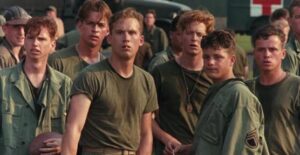
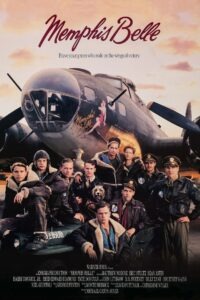
ILLUMINATE: I’ve heard they’re amazing!
DIAMOND: Growing up, all my favorite movies, especially the James Bond movies, were all shot at Pinewood. So, for me, Pinewood was iconic, right? More so than obviously, we’ve all shot at Warner Brothers. You’ve shot at Paramount, you’ve shot on the Fox lot, and those are cool. But for me, Pinewood, because there’s so much history of cinema there. So we’re shooting at Pinewood, my favorite studio, which is just a trip unto itself.
But it really spoiled me because I thought, “Oh, I’m going to have all these exotic locations.” And back then they would pay to fly Americans to London. The whole cast, we’re all American. They flew all over there, ten of us, and we’re there for four months and live like kings. But then as the years went on, locations often became less and less romantic. We all shoot in Vancouver all the time. And Toronto, where I am right now, because there’s tax breaks, or suddenly we’re shooting in Atlanta all the time.
Or more recently, I pretty much feel like I only work in New Orleans and New Orleans does a ton of stuff. New Orleans is a cool location. But what’s interesting is, I think only one time I’ve shot in New Orleans for New Orleans to be New Orleans. And every other time, New Orleans is a stand in for Los Angeles or some other. And the thing is, have you been to New Orleans?
ILLUMINATE: I haven’t.
DIAMOND: Okay. So there’s one thing that’s distinct about New Orleans is that New Orleans looks like New Orleans. It doesn’t look like anywhere else. It is a singular place. So if you’re shooting New Orleans to be New Orleans, you’re in the right place. But if you’re shooting it to be Los Angeles, which is funny because I play all these I play evil white guys. I am literally on three different shows that had the same mansion as my mansion because it was the only mansion.
Which is hilarious, right? Because the first time I was supposed to be in Beverly Hills, and it was the only house that wasn’t all that beautiful colonial New Orleans architecture with the wrought iron and all that.
This could pass for Beverly Hills. Literally, I was just down there like three shows in a row. I went down there and it was my house. I felt right at home. I knew where everything was.
So Mexico was so exciting. And what I think also made it really fun were a couple of things. COVID’s really changed filmmaking because it’s going back to more of how it was in the old days, because in the old days they would just bring you out for pretty much the whole time. And so the cast and the crew, you have this real great opportunity to bond and spend time together.
And that’s one of the best aspects of it is, you know, one of my favorite parts about being an actor is that you meet really cool, interesting people. Now with COVID, because you have to be there a few days before, you have to get tested, suddenly you had time to acclimate and also hang out with people. And then with this show, what was so great, we’re all in the same hotels and you could walk on the beach from hotel to hotel. They’re all right next to each other. And then also we shot French Hours. We shot ten-hour days, so it was great. Every night we all got finished at a reasonable hour so you could get together for dinner and have a social life. And for me, that was my favorite. One of the best parts about Mosquito Coast that we did together was just like everyone was cool and then we’d get to hang out. And I really loved that. Mexico was exotic and beautiful location. I made sure I went snorkeling or paddleboarding or kayaking every day. I made sure I got into the ocean every day. I went snorkeling right outside the lighthouse in Tulum in the village and there were tons of sea turtles swimming all around us. And it was super.
It’s a remarkable place and an amazing location. Everyone was lovely and the crew were just spectacular.
ILLUMINATE: They were amazing. That crew was amazing.
DIAMOND: You know, I think people often forget how lucky we are to get to do this. When people complain about this job, I mean, we’re playing pretend for a living and we’re making TV shows and movies. We’re so lucky to do it. And down there, you could feel it. Everyone even down to the background, right. Everyone was super excited to be there. And that’s such a lovely environment to be in. Old world charm, yeah.
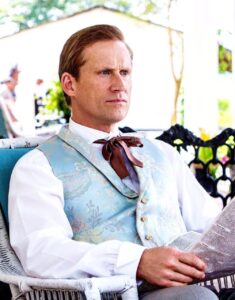
ILLUMINATE: You live in Toronto. Is it difficult for you to have to travel for all those roles? And is it difficult not being in a place like L.A. or New York? Because I know Toronto does have a big hub itself.
DIAMOND: I moved up here prior to the pandemic, but I’ve been living in California since 1992. And I’ve been in L.A. for a long, long time. And then I’d gotten to a place in my career where auditioning wasn’t sort of a regular thing and I was on a show. So we moved up to Los Olivos. We moved up to the wine country about 2 hours north of L.A. because that was a dream place. And it was perfect because my daughter was about to go to sort of the next iteration of school and we’re like, “Let’s go now.” We went up there and so she went to school at the base of the National Forest there.
And it was just we had this, you know, we had a five-acre ranch. And it was just an amazing, amazing time and a great place to raise a kid. And I was hiking and I dropped her off at school and go hiking the national forest every day. So that was spectacular. And it worked because the business had now gone…. wasn’t centralized in Los Angeles.
So I was luckily on a show in L.A. at the time, but everything else I was doing was somewhere else. I was either going to Vancouver or I was going to New Orleans or Atlanta, so I thought it didn’t really matter where I lived anymore because you were going to get on a plane to go there.
And so living about two and a half hours outside of L.A. work, that worked great for years. And the second my family moved here to Toronto, my wife wanted to go back to work. We wanted to give our kid a little city life. I’d grown up in New York and my wife had grown up here, and she’s a dual citizen and my daughter was a dual citizen. We thought, “Oh, let’s give Toronto a try.” And and I thought, “Great.” But they went out ahead of me because I was, of course, I got a show in California. So now they’re here in Toronto and I’d been on show for two years up here, the last long term show I was on while we were living in Los Olivos.
And then of course, since we moved here, I only worked in California. Since we’ve been here right now, I’m on a show here (Toronto) now. And it’s the first time in three years since we’ve been here that I’ve worked even in Toronto or Canada. I’ve only worked on shows in L.A. and literally only worked on shows in L.A. and of course, globally. This would have been so convenient when I lived in California but it’s always that’s how it’s going to go. I think to answer your question, the business has changed, right? I mean, sometimes they want you to be local and you can be local, but it’s also self tapes aren’t going away, right?
ILLUMINATE: Right. It seems that that’s now the main focus. And it’s I first like of course, when it happens, it’s like, oh, we’re going to do tapes, we’re not going to go in person, we’re not going to get to show our personality in the same way. Connect to the casting director. It gives us more freedom in some ways. Everything that I’ve booked in the last two years has been from self tape. I think that it’s going to stay and I think that it’s actually been really helpful for us.
DIAMOND: Yeah. I enjoy it because my wife is an amazing actor. Now she’s going back to business and she had retired when our kid was born. Now she’s got five shows right now. I call her the Meryl Streep of Canada. She’s the more talented member of the Diamond household.
But it’s great because we can do each other’s self tapes and then they’re fun because it’s like we can improvise with each other because I know it can be hard. Some actors, you know, if you’re married to an accountant or lawyer or someone who’s just not, it can be challenging. But my daughter is also really good. Like we were on the road, I got BETTER CALL SAUL. They were like, “Yeah, you got to put yourself on tape.” And she and I were in some hotel room in Springfield, Missouri, and we shot it in the corner of the hotel room and they got it a couple days later. But she’s quite good. She gives me pretty intense notes so she’s highly critical of me.
ILLUMINATE: You’re like, I know if I tape with her, she’s going to give me at least one note.
DIAMOND: But, you know, when you’re doing your audition, especially a self-tape, like, I need to be amazing from A to Z, right? You have to have a little discipline about it. I rarely allow myself to do more than three takes. If you haven’t found it then, if you haven’t had the fun and played, I mean, I think that’s probably why they do the Zooms. I think they want to make sure that you didn’t do 97 takes right.
ILLUMINATE: Exactly. And it’s so funny how often in auditions you do it one way, you book it, and then on set it’s completely different, of course. They sometimes direct you to be completely different. But I guess it’s because they know that we have the range and that we made the strong choices so they can pull us back or push us to go further if they want to. I think that in some ways it’s ultimately just up to do they think that we will try to make those bold choices and will we connect with the character? Will we connect with the scene? And can they just redirect us to do whatever their vision.
DIAMOND: Right.
ILLUMINATE: It’s interesting because art is so subjective.
DIAMOND: Oh, yeah.
ILLUMINATE: I was doing some digging into your film history because you’ve been in so many projects. BETTER CALL SAUL, GASLIT which I’m also in….
DIAMOND: Yes, right.
ILLUMINATE: BOSCH, DOLLHOUSE…..so many projects. One of them that you were in for 69 episodes was HOMICIDE: LIFE ON THE STREET. You’re in that from ‘95 to ‘98, and your character had so many rollercoasters of a storyline. There was corruption, there was almost being killed numerous times, dealing with a drug kingpin. That’s so much for a character to go through. Was there ever any plotline that you had in that show that you found that was almost too challenging but then ended up being really rewarding?
DIAMOND: What was special about that character, that was probably Mike Kellerman, who I played on HOMICIDE. He is, I probably would say, he’s the favorite character I’ve ever played, right? It was a dream come true. I wanted to be on that show. I remember watching the pilot I was in. I was shooting their first episode. I was shooting a pilot in Vancouver and their first episode aired. I go, “I want to be on that show” because there was a period of time I was obsessed with cops. The time was 1993, and I almost contemplated quitting acting and becoming a cop in L.A. For a little while, just because having some sort of existential crisis and all my cop friends all wanted to be actors, I was like, “Oh, you know, I’m really an actor.”
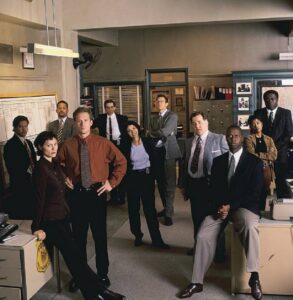
So, when they brought me on the show, I had been basically preparing to play that character for two, three years. And I don’t think they knew that. I think originally they would bring me on to do A Little Beefcake on the show, but it didn’t end up being that way. So right away the writers realized, “Oh, we can take him in these other areas. You know there’s an adage, right on television, the character is the actor, right? On some level because you’re playing him so much. I had such a kinship with him and I felt he is who I would be had I grown up in his circumstances. So I didn’t find anything challenging, but I just remember being so delighted.
I felt like they gave me so many gifts. I remember sitting in the office because they had scripts would come out once a week, right? As we were starting one episode, the next episode script would come out. It’s so organized. Nothing like how things are today. And I would sit there in the office and read it. So you had a little mailbox in the production office where your script would be, and I would just read them like, Oh my God, I remember calling David Simon, who written the book that the show is based on, and then created “The Wire.” He was a writer on the show and he wrote this where I kill Luther Mahoney. And I was like, “This is amazing!” I’m like, “This is amazing! I can’t believe you! And you’re putting me in these circumstances!!” And that was a joy.
And that was also a great place to pretend because we had no sets. It was all real. So even where the squad room was, it wasn’t flat. It was a building. Hilariously, it’s now a luxury hotel, and I went and stayed there two years ago with my wife and my kid. And literally where we’re having lunch, I was like, “Oh, this is where the restaurant is.” I go, “This is where my trailer was.” And then we walk into this sort of banquet room where someone is doing their wedding photos. I go, “This is the squad room. My desk was right here.” And it was so cool to be back on the pier.
It was a functioning building, and everything was practical. So, if you saw us going up the stairs, we were going up the stairs and going in there and coming out was a real building and everything else was shot on location. Baltimore is a character in that show.
So it was really an amazing experience. I cried when I was knowing I was doing my last episode. When I was doing my last episode, because the character was sort of written into a corner because I killed this guy. And it was, you know, questionable circumstances. And so we ended up having nowhere for Mike Kellerman to go anymore.
He couldn’t really be sort of at his desk and stuff. And I remember Tom called me, he said, “What do you want to do?” I go, “I think I think we should end it. I think this should be my last season.” And he’s like, “Okay, great, but can I not kill you?” And I’m like, “Yeah, you don’t have to kill me.”
So I remember when my first, when it ended, I remember sitting in my car and, you know, I was crying, you know, I think it had handed back in my badge and my God, you know, he’d been a real part of me. So that was I mean, what was challenging about it in the beginning for me was it was really my television bootcamp because I started in the theater, and I felt much more comfortable still on stage at that point than I did in front of a camera. I was still scared of the camera. And then when I got in HOMICIDE, that was my crash course in television acting. And it was what was really exciting about that, too, was it was all handheld, so you never knew when you were going to be on camera, which made the scenes much more exciting. So no one could check out and just the DP would just swing around and grab you. So that was a really, really, really, really special experience.
You certainly get challenging material. The ones that you really love are the ones where you go, “Oh, I hope I’m good enough. I hope that I’m good enough because this material is spectacular and it’s fun.”
You know, I’ve been really lucky and I love what I do. And and in the last four or five years of falling madly in love with it again in the same way, like the same passion that I had as a teenager starting out and there’s no better feeling than, like, the excitement the night before, like, “Oh, I can’t wait to go to work the next day and play this scene.” There’s nothing better than that feeling. And you know, the delightful butterflies and you’re just going like, “I can’t wait to do this. It’s going to be really fun and it’s exciting.” So like I say, we’re really lucky to get to do what we do. And I, I never forget that, you know, and it’s just amazing.
ILLUMINATE: Exactly. And sets are such a magical environment. You get to work with other people. Your work will be on TV or in a movie and we get to entertain people.
DIAMOND: And it’s hard, right? You know, sometimes it’s hard, you know, to do emotional things that you, places you don’t want to go, that you’re going to have to go to do it. But that’s you know, it keeps you young because it’s never the same day. And it’s 1000 first days of school, right? That’s how I always think of it, because you’re meeting new people. And like you said so eloquently, you know, you’ve got to create a relationship in 2 seconds. Just met, rolling, and, you know, that’s what you do. And you’re like, okay. And we’re….
ILLUMINATE: We’re basically like family. That’s our character. What’s funny is as soon as we wrapped THE MOSQUITO COAST, got home and was watching TV and it was like, “Oh, that’s Reed. I just worked with him!” I saw you in four different shows and one of my favorites that I watched was WAYWARD PINES.
DIAMOND: Oh, wow. Yeah.
And I had no idea you were in it until I was watching it. I was like, “Oh my gosh! I just worked with him.” Tell me a little bit about working on that one.
DIAMOND: That was an interesting one because I remember some shots. Once again, I’m living in Los Olivos, filming a movie in California. We shot that up in Vancouver, of course, I was going up to Vancouver. But it was one of those where I read the pilot. I had to audition for that one and I read the pilot. I’m sitting in my room and the pilot was so compelling. And I was like, “Oh, well, I’ll find out what happens when I get the part.” And I’m like, Well, what if I don’t get the part?” So I immediately downloaded the book that it was based on that Blake Crouch wrote, and in one sitting, I didn’t get up from my chair in my office and I just read the whole book. It was so good. I was like, “Oh, I want to tell this story. I want to make this show.” It was an interesting experience because we didn’t make the book. We changed a lot of things. But it was a strange experience.
There were a lot of big personalities. And it was one of those shows where a lot of the big personalities would come in with their versions of the scene and rewrite the scene and not necessarily for the better. So it was a little crazy. I remember one night where an actor was supposed to deliver like a three-page monologue to like 100 extras. The set wasn’t a set. We had taken over a town.
ILLUMINATE: I think I know what scene you’re talking about.
DIAMOND: And then he came out and he decided to sing a song instead. And I’m like, “This is cool,” because I’m always like, let’s make it weird. Like, I have no problem. Make it weird. There’s a reason I think that at the end of that show they killed off the entire cast.
But I’ll give you a really happy Hollywood story about someone writing scenes.
So I had a great scene in this movie, MONEYBALL with Brad Pitt and Bennett Miller directed it. And we shot the scene on the first day of shooting on MONEYBALL. And so that was on a Monday. So on the Friday, we come in for a rehearsal and I’m like, “Rehearsal?” I’m so used to TV and we didn’t shoot it, but we came in for rehearsal.
And I think the script had been written by Sorkin. Aaron Sorkin. But Brad comes in with his version of the scene and I’m like, “Oh God, lead actors coming in with his version of the scene.” True to what an awesome dude he is, he gave me so much more to do. He’d written tons of lines for me, you know? So I was like, “There’s no way not to be. I’m so in love with Brad Pitt.” But I was like, that’s it. Of course. He gives me more to do and then when we shot the scene, we ended up improvising almost the whole thing. And every once in a while, I would hit lines from somebody’s version of the script.
And that was a crazy one too, because I remember we shot Brad’s coverage first. So we’re shooting that way in that direction. And there’s all these background guys behind. And we’re in my office. I’m the manager of the Cleveland Indians, general manager or whatever. And we’d just improvise, and we shot it on film. So, Bennett Miller would sit under the camera, and we would improvise. We would just keep going, repeating until the mags ran out, until the film ran out. They reload and we keep going again. So for 6 hours before lunch, we did Brad’s side. And then we go to lunch. I’ve been improvising for 6 hours and all the background guys are like, “Oh man, you’re killing it so good!” I go, “I’m not killing it. It hasn’t happened yet.”
Like none of that’s on film. Like I don’t like I’m like I don’t know if I can improvise for another 6 hours when we come back from lunch. But then luckily, we came back and we got it all in 2 hours. Bennett would just call out, because we’d gone on all these crazy threads of improvs. Like one where I did a whole Captain Kirk thing and like he would call out, “Captain Kirk.” And then we’d just do the Captain Kirk version. And he’d call it like, “Solusta Trek,” whatever the other one was. And we would do it. But it was an incredible experience. And so you see, sometimes people can come in with their own version of the scene and it’s better. You never know. Kiefer When I worked with Kiefer on 24, he’d always rewrite the scenes and they were always better.
He didn’t necessarily give me more to do, but they were definitely better.
ILLUMINATE: It’s cool that you can say, you know, Brad Pitt and Kiefer Sutherland, you know, rewrote some of your scenes, you know?
DIAMOND: Yeah, yeah. It’s fun.
ILLUMINATE: It’s fun getting to hear that behind-the-scenes process and getting to hear those things. I read that you went to Juilliard and that you’re on Broadway. But another really interesting thing about you is you had your own band, which I had no clue about. So tell me how that got started.
DIAMOND: Well, that’s so funny. Listen, this is a good story. So I love music. I remember in eighth grade, I was really into playing music and I had bands in high school. But really about 10th grade, I made a decision. I was like, “Music or acting?” I was like “Acting.” You know, that was really where I wasn’t. I loved playing music, but I wasn’t particularly good. And then I went down the acting road and then somewhere I guess I was 39, right? So I’m in L.A. and I just started playing with a buddy. And then we started doing covers, which are like post-punk bands and we’d play. And then one day my wife came to rehearsal and she sang a song.
She has an amazing voice. She’s an incredible singer. And, and it’s like, “You should be the singer in the band.” And she’s like, “I don’t like your songs. They’re stupid.” And so she and I started writing together. She would write all the lyrics, I’d write all the music. And we had the band. We were playing for a while. We played until she had our daughter, Eilis. Our kid. We had the band for about three years and it was great. It was so much fun for me because acting’s my day job and music is still….there’s something I just love so much about it. I play it all the time. It was great writing all our own songs. We recorded and I built a home studio and we’re recording there. But now the best part is, I’ve got a new band with my kid. My kid just turned 14, right? And so one, I guess it was only like six weeks ago and I was off. There’s a great little music shop here down the street. And I was going to buy a new amp, guitar amp. And I said, “Hey, do you wanna come with me?” and she said, “Yeah. I’d love to come with you.”
And as we’re walking home…. and she help me pick out a better amp because I was looking at one amp. And the guy was like, “Oh, listen to this one.” And she’s like, “That’s a much better amp.” She was right. It’s a much better amp. She’s got immaculate taste. And as we were walking home, she goes, “You know I’d really like to play the bass?” And I was like, “Oh my God, I’ve got a bass upstairs!” And I was like, “Let’s go home and let’s go play.” And she’s a natural, really. Right away! We’re playing ”Joy Division” songs. She’s playing. We have my new band. Our old band was Chuck Valiant. Right now, we’re sort of a punk band.
We named after my dog’s breath. I’m like, it’s a mixture of piss and fish. So we’re “Pissed Fish” right now. That’s our band. I think we’ll change it because we went to two punk shows. We drove to Detroit to see this Australian band that we love, “Amyl and The Sniffers,” and that was cool, like her first grown up gig. So we’re on the floor, mosh pit, real, real punk band. They were great. And then we went to see another band here and they were, hardcore punk. She turns to me and she’s like, “I think we’re a little more post-punk, like “Echo & The Bunnymen.” I’m like “We are definitely. We’re more melodic.” So, “Piss Fish.” We may have to change the name, but yeah, I love music. I wish, you know….
ILLUMINATE: I love that you are so involved with your family in both acting and music. That you guys really get to just create together.
DIAMOND: Yeah, we’re lucky. We’re really lucky. I mean, it’s funny, I’m on a show here and my wife, of course, I told you she’s on five shows. She’s on my show, too. So now, it’s the first time we’ve been on the same show together since the movie we met on 21 years ago. We haven’t acted together, but we do act together on all of our self tapes.
Yeah, it’s great. You know, we’re really tight. Family is family first. You know, I love my career, but, I do it all so I can do with my family and pay for things. So it’s great. Yeah, it’s fun. It’s fun to be creative together. It’s great to have the music together and Marnie’s going to come and be in our band, too. She’s come for a couple of rehearsals. She throws in some acoustic guitar and lays down some vocals.
ILLUMINATE: Oh, I love that. I can’t wait to hear something from you.
DIAMOND: Yeah, now my daughter. We’re starting to write. She’s like, “Yeah, we got to do our own stuff.” We’d already been jamming. So we come up with how songs are created. Like you just start playing this and I play something over it and then we’ll put some words on it. She’s had a birthday, she’s got a bunch of guitar, bass gear. I’m a lucky guy.
ILLUMINATE: Oh, I love that. Before we wrap things up, are there any upcoming projects besides THE MOSQUITO COAST that we want everyone to go check out that you soon.
DIAMOND: For sure. So THE MOSQUITO COAST and then I’ve got something very exciting coming out.
ILLUMINATE: That’s great.
DIAMOND: Yeah. Thank you. Oh, my God. This has been so much fun. You’re so wonderful to chat with. I do these a lot and you’re just a delight. So thank you so much. It’s a pleasure for me and an honor.
ILLUMINATE: Yeah, thank you. I actually really love working with you! And I’m so happy that we got to connect and talk a little bit.
Now, where can people find you on social media?
DIAMOND: I’m @thereeddiamond on Instagram because @Reed Diamond was taken. I know @thereeddiamond and Instagram is my favorite place and I’m @reeddiamond on Twitter. I go in there and just try to put funny stuff up there. But you got to be so careful. Like, no politics. So Instagram….I like it so much more because you just put your silly pictures up there.
ILLUMINATE: Exactly you put on your picture. You know, that’s it. You don’t have to really worry the same way.
DIAMOND: But as my daughter talks, we were at the amusement park for the Halloween stuff, “Canada’s Wonderland” this weekend. And she’s like, “You’re terrible at taking selfies.” And the guys don’t do it that much. She’s like, “You don’t know how to hold the camera.” And I’m like, “I don’t.”
ILLUMINATE: And does she have to give you lessons on how to take a selfie?
DIAMOND: I need a lot of lessons. I need help. I’m living in another century.
ILLUMINATE: You’re like, “I gotta catch up!” But it’s so interesting with technology changing all the time, you never know what’s going to happen. The thing that I’m on the most other than Instagram is Facebook.
DIAMOND: I’m only on Facebook to know when people’s birthdays are.
ILLUMINATE: So funny.
Both: Thank you so much!
ILLUMINATE: Thank you so much for being here.
DIAMOND: All right, I want to go take my kid trick or treating now.
ILLUMINATE: Awesome. Happy Halloween!
DIAMOND: Happy Halloween. Cheers.
ILLUMINATE: Bye.
FOLLOW REED DIAMOND:
Social media and video links
Facebook: https://www.facebook.com/Reed-Diamond-103650779023514
Twitter: @reeddiamond
Instagram: @thereeddiamond
IMDb: imdb.me/reeddiamond
WIKIPEDIA: https://en.wikipedia.org/wiki/Reed_Diamond
